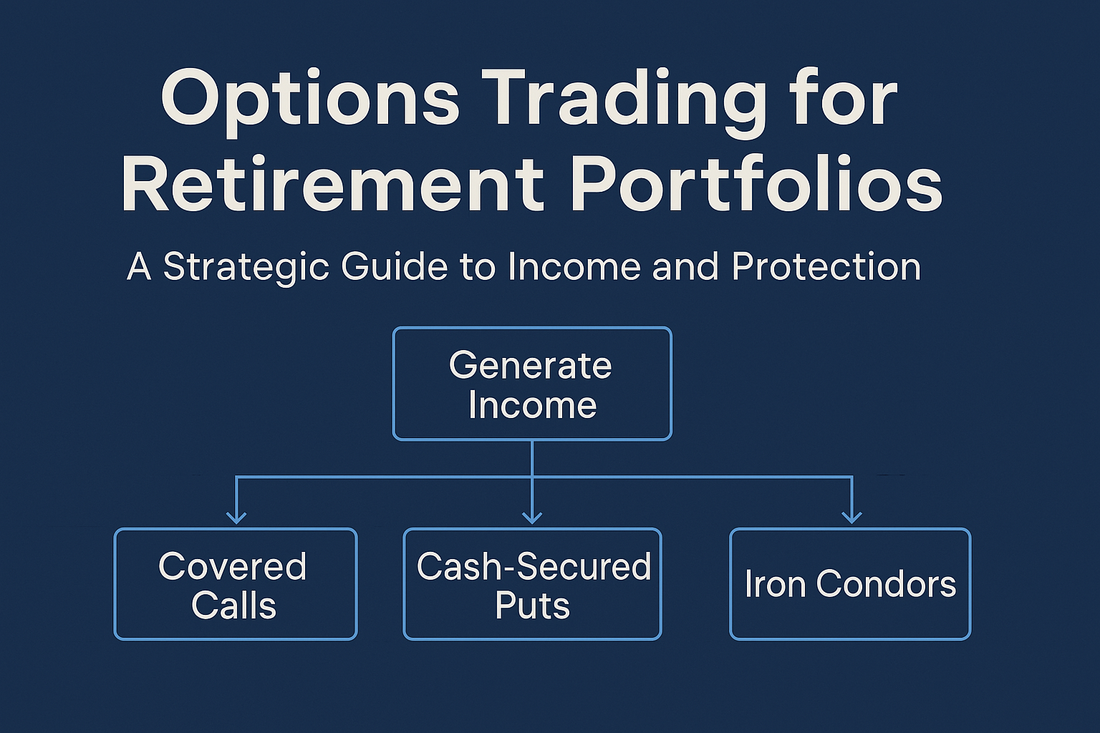
Options Trading for Retirement Portfolios: A Strategic Guide to Income and Protection
Keywords: options trading for retirement, options income strategies, protective puts, covered calls, portfolio hedging, financial freedom, retire with options
💡 Introduction: Why Options Belong in a Retirement Portfolio
Retirement isn’t just about building wealth—it’s about preserving it while generating reliable income. Traditionally, retirement portfolios relied on bonds, dividend stocks, and annuities. But with low interest rates and volatile markets, these solutions often fall short.
Enter options trading—a powerful yet often overlooked tool for retirees and those planning for retirement.
When used correctly, options can:
- Generate regular income
- Protect capital during downturns
- Enhance portfolio flexibility
This article will explore income strategies, risk management, and real-world case studies of how self-sufficient traders use options to support their retirement journey—all within a controlled and risk-aware framework.
📘 Section 1: Income Strategies for Retirement Portfolios
Retirement-focused options trading is less about speculation and more about consistent, risk-managed returns. These strategies are ideal for conservative to moderately active traders.
✅ Covered Calls (The Classic Income Play)
What it is: Own 100 shares of stock and sell a call option against it.
Why it works: You collect a premium upfront. If the stock stays below the strike price, you keep both the stock and the premium. If it rises, your upside is capped, but you've already profited.
Example:
- Own 100 shares of Coca-Cola (KO) at $60
- Sell a 1-month $62.50 call for $1.00
- If KO stays below $62.50, you keep the $100 premium
- Annualized, this can yield 6–12% extra return
📌 Best for: Retirees holding blue-chip stocks or ETFs they don’t plan to sell.
💰 Cash-Secured Puts (Buy at a Discount)
What it is: Sell a put option on a stock you’d like to own, with enough cash in your account to buy if assigned.
Why it works: You either collect income if the stock stays above the strike, or you buy the stock at a discount if it drops.
Example:
- You want to buy Johnson & Johnson (JNJ) at $150
- Sell a 1-month $145 put for $1.50
- If JNJ stays above $145, keep the $150 premium
- If it drops, you're assigned shares at a net $143.50
📌 Best for: Investors who want to accumulate high-quality stocks on pullbacks.
🪙 Diagonal Spreads (Income + Long Exposure)
What it is: Buy a long-dated call and sell short-dated calls against it repeatedly.
Why it works: Generates consistent income from time decay while maintaining some long exposure.
Example:
- Buy a 6-month SPY $400 call
- Sell a 1-week $410 call every Friday
- Income offsets cost of the long call and cushions downside
📌 Best for: Traders wanting income with limited capital and controlled upside.
🔐 Collars (Low-Risk Protection)
What it is: Hold a stock, sell a call, and buy a put.
Why it works: Limits both upside and downside, great for capital preservation.
Example:
- Hold AAPL at $170
- Sell $175 call, buy $165 put
- You’re capped at $175 profit, but protected below $165
📌 Best for: Risk-averse retirees with large single-stock holdings.
📅 Weekly Options (Micro-Income Engine)
What it is: Use ultra-short duration options for income, like weekly covered calls or iron condors.
Why it works: Weekly options allow for frequent income opportunities with defined risk.
Example:
- Sell weekly SPY $420/$425 call spread for $0.60
- Use small size for controlled exposure
- Repeat weekly for compounding premium
📌 Best for: Active retirees with time to manage trades weekly.
🔒 Section 2: Risk Management Techniques for Retirement Traders
Income without protection is a recipe for disaster—especially in retirement. Here’s how to protect your capital.
🛡️ Protective Puts
Buy a put to insure your portfolio against downside—like buying health insurance for your nest egg.
- Best during bear markets or before earnings
- Use with dividend-paying stocks or ETFs
- Helps limit drawdowns during crashes
📌 Tip: Consider buying 3-month ATM puts on broad indexes like SPY or QQQ.
⚖️ Portfolio Delta Balancing
Track the delta of your entire portfolio to understand directional risk.
- Keep your net delta neutral or slightly positive
- Reduce size during periods of high volatility
- Consider spreading trades across sectors
📌 Tool: Use Thinkorswim or Tastytrade to calculate portfolio delta.
🔄 Rolling and Adjusting Positions
Learn to manage trades proactively:
- Roll puts down and out if the stock drops
- Roll covered calls up if the stock runs
- Adjust spreads to maintain optimal breakeven
📌 Advanced tip: Use trailing stop-losses for better risk control.
🔄 Hedging with Inverse ETFs
For passive portfolios, inverse ETF options (like SPXU, SQQQ) can hedge against broad market downturns.
- Buy calls on inverse ETFs as crash protection
- Use sparingly—these decay over time
- Great during bear markets or black swan events
🧠 Section 3: Real-World Case Studies
👩💼 Case Study 1: Susan’s Dividend + Covered Call Strategy
Profile: 63 years old, retired teacher, $500K portfolio
Setup:
- Holds dividend stocks (PG, JNJ, VZ)
- Sells monthly calls above resistance
- Earns 5–8% extra annual return on top of dividends
Result:
- Generates $2,500–$3,000/month in income
- Reduces need to draw down capital
🧠 Lesson: Great for supplementing pensions or annuities.
👨🔧 Case Study 2: Mark’s Conservative Put-Writing Plan
Profile: 58, nearing retirement, $300K IRA
Setup:
- Sells cash-secured puts on ETFs (SPY, DIA)
- Targets 1% monthly return
- Buys protective puts during high IV
Result:
- Buys SPY at discounts
- Uses put premiums to build positions cheaper
🧠 Lesson: Ideal for building positions slowly with downside buffer.
👨🏫 Case Study 3: Bob’s Balanced Retirement Portfolio
Profile: 65, retired principal, $700K portfolio
Setup:
- 60% stocks, 30% bonds, 10% options
- Uses collars on AAPL, MSFT
- Adds iron condors on SPX for weekly income
Result:
- Monthly income of $2,800
- Keeps portfolio risk-controlled during corrections
🧠 Lesson: Blends traditional with modern strategies.
📊 Flowchart: Options Income Strategy in Retirement
Here’s a simplified decision-making process:

⚠️ Mistakes to Avoid When Using Options for Retirement
- Overleveraging
- Stay conservative. Use capital you’re willing to tie up.
- Selling naked options without coverage
- Always be cash-secured or hedged.
- Ignoring tax implications
- Short-term gains may be taxed higher outside retirement accounts.
- Not understanding Greeks
- Delta and theta are critical in income strategies.
- Holding through earnings without a plan
- Events can cause volatility crush or whipsaws.
🔎 Frequently Asked Questions
Q: Can I trade options in my IRA?
Yes, many brokers allow covered calls, cash-secured puts, and spreads inside IRAs.
Q: How much of my retirement portfolio should be in options?
Start with 5–15% of your portfolio. Focus on conservative strategies.
Q: What’s the safest options strategy for retirees?
Covered calls or collars on blue-chip stocks offer great income with low risk.
🧭 Final Thoughts: Retire Smarter with Options
Options are not just for Wall Street—they’re for anyone serious about building a smarter, safer, and more income-generating retirement portfolio.
When used properly, they offer retirees:
- Steady income
- Downside protection
- More control and flexibility
Forget the fear. You don’t need to be aggressive or technical. With a few well-placed strategies, you can make options a core part of your retirement toolkit—and move one step closer to the financial independence you’ve worked so hard to achieve.
🚀 Ready to Add Options to Your Retirement Game Plan?
At www.optionstranglers.com.sg we offer:
✅ In-depth live 1-1 sessions / group classes
✅ Trade examples and breakdowns
✅ Community mentorship and support
👉 Ready to upgrade your strategy and trade like a pro?
Visit www.optionstranglers.com.sg and start your journey to financial freedom today.
Your future is an option. Choose wisely.
⚠️ Disclaimer:
Options involve risk and are not suitable for all investors. Always consult with a financial advisor before investing.
